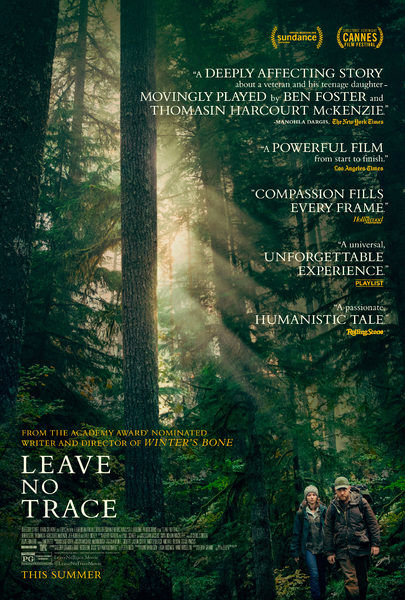
Debra Granik directed her cinematographer Michael McDonough to open her new film Leave No Trace with National Geographic-style shots of a verdant Oregon rainforest. There, among all the shades of green, we eventually distinguish a hooded-jacket-wearing figure … no, it is two figures, carefully making their way through the dense undergrowth.
We get to meet Will (Ben Foster), the homeless-by-choice vet with PTSD and his 13-year-old daughter, Tom (Thomasin Harcourt McKenzie) up close and personal while they forage for food, build a fire, capture rain water, sleep in a cleverly concealed hidey-hole, read, play chess and practice emergency drills to avoid hikers, park rangers and the police.
Like the off-the-grid father played by Viggo Mortensen in Captain Fantastic, this dad is a wary but knowledgeable mentor — teaching important forest craft survival skills along with reading, math and chess strategies.
But there are several dramatic differences between these two families. In Leave No Trace, the mother is long dead, there are no siblings, and except for rare but unavoidable trips to the vet hospital and grocery store, Will and Tom avoid all human contact.
Since they are breaking several laws by living on protected parkland, Will and Tom inevitably show up on officialdom’s radar, and unwillingly become cogs in the system. Surprisingly, there are no bad people in this story. The social workers who administer psychological profiles to Will and Tom do so simply to gather information — and are even willing to change how the test is administered to insure both Dad and Daughter are comfortable.
Similarly, as a vulnerable young female, Tom’s safety seems paramount in everyone’s mind. “Has anyone touched you inappropriately or forced you to do something that made you uncomfortable?” the social worker asks with obvious concern. Even the interstate truck driver who drives Will and Tom from Oregon to Washington won’t do so until he is able to take Tom aside and verify that she is safe.
As we learned in her Academy Award-nominated film, Winter’s Bone, Granik is a master of understatement and sustained silences. The screenplays (both co-written with producer Anne Rossellini), purposefully minimize dialogue whenever the visuals tells the audience what it needs to know.
Consequently, it takes some time for us to learn the depth and danger inherent in Will’s mental illness. It takes some time for us to learn that Tom is the wiser and more grown-up member of the family. It takes some time for us to understand that this particular form of homelessness is one of choice — not circumstance, and the problem of homelessness cannot be as easily encapsulated as our politicians and political pundits want us to believe.
But at its core, Leave No Trace is about love and parenting. Will is trying his damnedest to adapt the way he needs to live to maintain his sanity while caring for and protecting his daughter at the same time. We are never told how difficult this is for Will, but we don’t need to hear the words.
Similarly, we come to learn how being forced to be the grown up encompasses Tom’s state of being. It is Thomasin Harcourt McKenzie’s acting skill that makes this work so well — along with Granik’s sure-handed direction. For just like she did with young Jennifer Lawrence in Winter’s Bone, Granik has once again discovered a talented newcomer to bear the heavy lifting in an emotionally complex story.
Comments? E-Mail gi*********@*****st.net.








